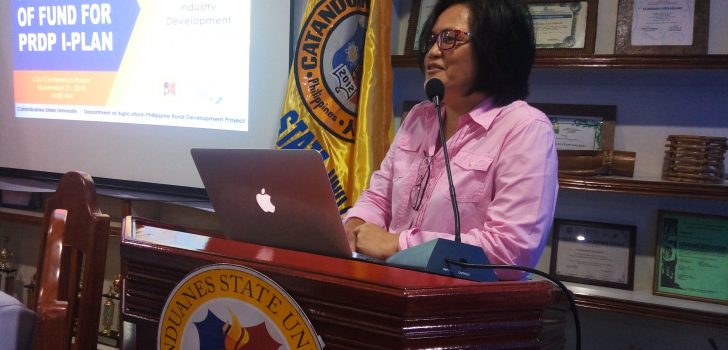 PRDP South Luzon I-PLAN Head Jo Marie Libarnes turns over the check amounting to P840,000 to Catanduanes State University officials, headed by President Minerva Morales.
PRDP South Luzon I-PLAN Head Jo Marie Libarnes turns over the check amounting to P840,000 to Catanduanes State University officials, headed by President Minerva Morales.
PRDP, CSU to formulate roadmap for Catanduanes’ mangrove crabs
VIRAC, CATANDUANES – Overharvesting of crablets and crabs beyond optimum capacity because of its insatiable demand is alarming for it leads to population decline, and worse, onset of extinction. Dr. Minerva Morales, president of Catanduanes State University, a biologist, told mangrove crab stakeholders.
The Philippine Rural Development Project (PRDP) in its effort to attain an inclusive, market-oriented and climate-resilient agri-fishery sector partnered with the CSU to ensure the sustainability of mangrove crabs, one of the province’s priority commodities.
In a Ceremonial Turn-Over of Fund for PRDP I-PLAN held in CSU on November 21, 2018, the Project turned-over its first tranche checks worth P840,000 to CSU to kick-off the Catanduanes Mangrove Resource Mapping and Stakeholders Engagement for Sustainable Crab Industry Development. Officials from the provincial local government unit, Provincial Agricultural & Fishery Council (PAFC), CSU project research team, Bureau of Fisheries and Aquatic Resources, Office of the Provincial Agriculturist, Municipal Planning and Development Coordinators and other mangrove crab stakeholders attended the activity.
The research and development (R&D) project will be conducted under the PRDP’s Local and National Level Planning Component (I-PLAN) 1.2 which supports the AFMP implementation through design of coordinated systems of technical support for the execution of subprojects prioritized in the Provincial Commodity Investment Plans (PCIPs).
Under the R&D project, CSU will assess the mangrove ecosystems in all municipalities of Catanduanes, except San Miguel which has no estuarine site. The project aims to provide benchmark information which will serve as a scientific basis in developing a roadmap for the sustainability of mangrove crabs as a valuable resource. It is designed to address the results of the value chain analysis (VCA) which showed that fisherfolk and other keyplayers will gain higher income if mangrove will serve as production platform in growing crabs to marketable size either under fishpond or aquasilviculture scheme instead of selling them as crablets.
Aside from the Mangrove Crab Industry Development Roadmap, the study also intends to formulate mangrove resource sustainability policies and support the operation of a mangrove crab industry technology hub. Moreover, it aims to enhance the capacity of stakeholders engaged in a profitable and sustainable industry beyond the crablet supply chain. Furthermore, one of CSU’s major expected outputs is a Sustainable Community-based Mangrove Crab Production and Resource Co-Management Plan.
The study includes determining the population dynamics of mangrove crabs in Catanduanes, the characteristics of the mangrove habitat, threats to sustainability of crabs as a resource in Catanduanes as well as the necessary community and interagency co-management and sustainability measures.
“We are happy with this development. Literature says that mangrove crab is food for the gods because it’s so expensive and there’s an insatiable demand and we have this opportunity to study and map the mangrove crabs in Catanduanes,” Morales said.
She added that collaborating with the PRDP is a milestone towards achieving the university’s vision of becoming a green university globally engaged in island research and innovations for societal advancement.
“The mangrove crabs should be here beyond the PRDP… This will enhance instructions in environmental science, fisheries and biological sciences and also in other programs. More publications and possibly, patents will result from this investigation. It’s an opportunity for the extension services community programs of the university. This will enhance and enrich the community involvement of the university while supporting them as far as technological interventions for mangrove crabs,” she remarked.
The Catanduanes Mangrove Resource Mapping and Stakeholders Engagement for Sustainable Crab Industry Development is a P2.1 million-worth R&D project under PRDP’s I-PLAN 1.2 subcomponent. According to PRDP South Luzon I-PLAN Head Jo Marie Libarnes, it is a pioneering project in the Philippines.
The project team will conduct its first data-gathering and ocular inspection on November 30, 2018 to include ecological profiling, time and motion study and focus group discussions with stakeholders.
PRDP also funded the P8.53 million-worth enterprise development (I-REAP) subproject Mangrove Crab Production and Marketing Enterprise in Panganiban, Catanduanes, which is now on its 11.78 percent stage of implementation.###(Annielyn L. Baleza, DA-RAFIS V)
